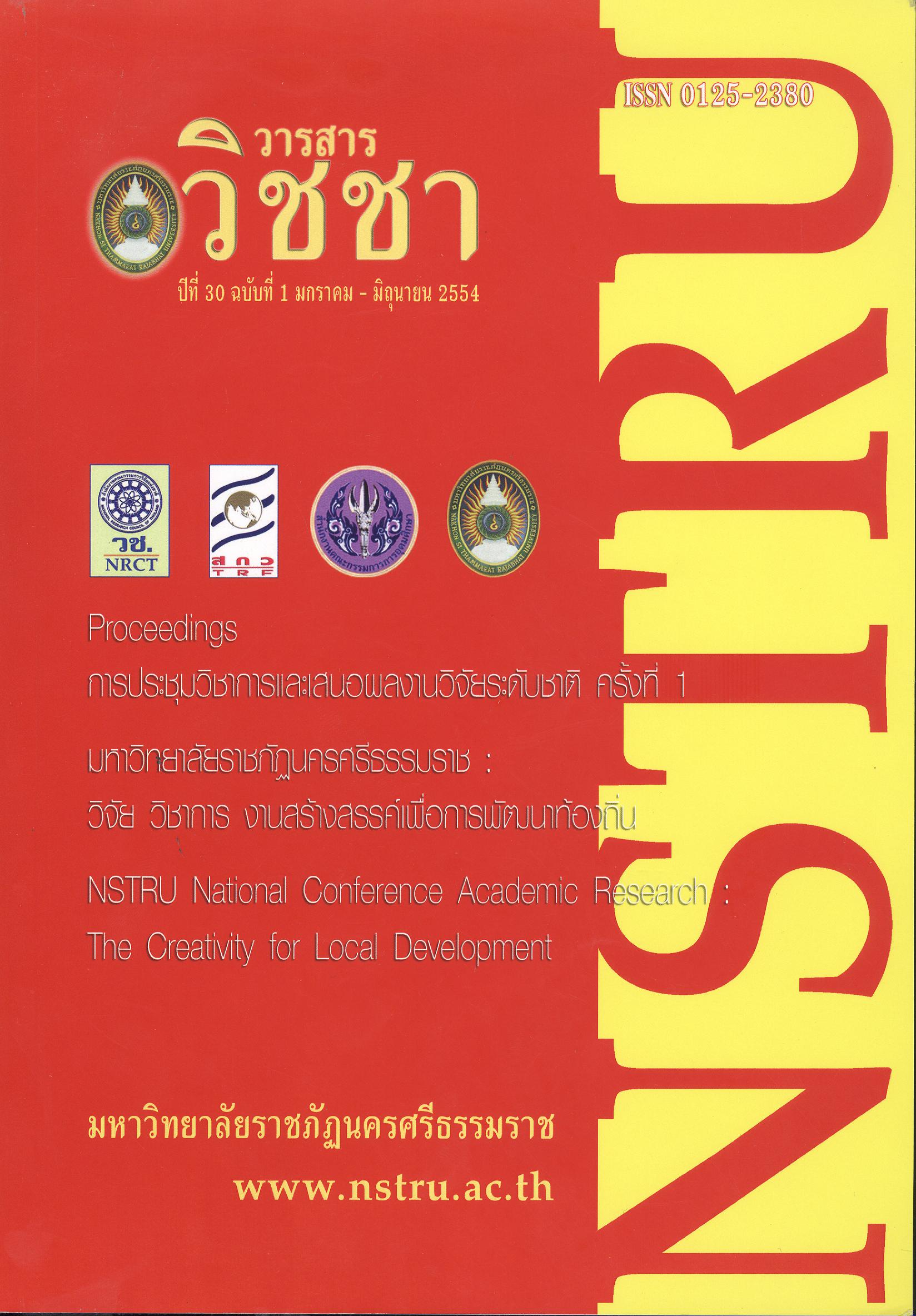การพัฒนาระบบประเมินสมรรถนะบัณฑิตสาขาการศึกษาปฐมวัย
Main Article Content
Abstract
การวิจัยในครั้งนี้มีวัตถุประสงค์ (1) เพื่อพัฒนาระบบประเมินสมรรถนะบัณฑิต และ (2) เพื่อประเมินประสิทธิภาพของระบบประเมิน วิธีดำเนินการวิจัยมี 2 ขั้นตอน คือ (1) กำหนดองค์ประกอบของระบบและพัฒนาระบบประเมินสมรรถนะบัณฑิต และ (2) ประเมินประสิทธิภาพของระบบ ประชากรประกอบด้วย (1) ผู้ให้ข้อมูลในการทดลองนำระบบไปใช้ ได้แก่ นักศึกษาสาขาการศึกษาปฐมวัยชั้นปีที่ 2, 4 และ 5 ชั้นปีละ 30 คน อาจารย์นิเทศก์ จำนวน 7 คน และเพื่อนนักศึกษาชั้นปีที่ 5 จำนวน 30 คน และ (2) ผู้ให้ข้อมูลในการประเมินคุณภาพของระบบ ได้แก่ อาจารย์นิเทศก์ จำนวน 7 คน นักศึกษา จำนวน 30 คน และเพื่อนนักศึกษา จำนวน 30 คนผู้ทรงคุณวุฒิจาก 5 มหาวิทยาลัยราชภัฏภาคใต้ จำนวน 25 คน เครื่องมือที่ใช้ในการวิจัย (1) แบบทดสอบความรู้ด้านการจัดการเรียนรู้ (2) แบบประเมินสมรรถนะด้านการจัดการเรียนรู้ และ (3) แบบสอบถามประสิทธิภาพของระบบ ซึ่งผลการวิจัยสรุปได้ดังนี้ (1) องค์ประกอบของระบบประเมินสมรรถนะบัณฑิตประกอบด้วย (1.1) ปัจจัยนำเข้า ได้แก่ มาตรฐานความรู้ด้านการจัดการเรียนรู้ นักศึกษาการศึกษาปฐมวัย เครื่องมือและกลไก (1.2) แนวปฏิบัติในการประเมิน ได้แก่ สิ่งที่มุ่งประเมิน เงื่อนไขการประเมิน (1.3) ผลลัพธ์ที่ได้ นักศึกษาได้ข้อมูลย้อนกลับนำไปวางแผนพัฒนาและผ่านการรับรองจากหลักสูตร (2) การประเมินระบบตามการรับรู้ของผู้ใช้ระบบและผู้ทรงคุณวุฒิตามเกณฑ์การประเมิน 4 ด้าน ได้แก่ (1) มีความเหมาะสม (Propriety standard) ในระดับมาก (2) มีความเป็นไปได้ (Feasibility standard) ในระดับมาก (3) มีความถูกต้อง (Accuracy standard) ในระดับมาก และ (4) นำไปใช้ประโยชน์ได้ (Utility standard) ในระดับมาก
The Development of a Competency Evaluation System for Early Childhood Graduated Program
The objectives of this study were to develop and evaluate the efficiency of a Competency of Evaluation System for Early Childhood Graduated Program. The methodologies of this study were: (1) decided the components of the system, (2) evaluated the efficiency of the system. The samples of this study consisted of 2 groups of informants: (1) the informants focusing on testing the system were students from second, fourth, and fifth year students (30 students of each year), 7 teachers, and 30 of fifth year students’ friends, and (2) the informants focusing on the evaluation of the system were 7 teachers, 30 of the fifth year students and 30 of the fifth year students’ friends and 25 professionals. The instruments used in this study were: (1) a knowledge management test, (2) knowledge management competency evaluation form, and (3) a questionnaire focusing on the efficiency of the system. The results of this study were: (1) the components of the Competency Evaluation System consisted of a) the input included knowledge management standard and students, b) the process included framework and guidelines of the evaluation such as the objectives, the conditions, and the presentation and the evaluation judgment, c) the output referring to the efficiency, usable system which offered academic advantages. (2) The competency of the system had 4 standards in high level : propriety, feasibility, accuracy and utility standard.
Article Details
เนื้อหาและข้อมูลในบทความที่ลงตีพิมพ์ในวารสารวิชชา มหาวิทยาลัยราชภัฏนครศรีธรรมราช ถือเป็นข้อคิดเห็นและความรับผิดชอบของผู้เขียนบทความโดยตรง ซึ่งกองบรรณาธิการวารสารไม่จำเป็นต้องเห็นด้วยหรือร่วมรับผิดชอบใด ๆ
บทความ ข้อมูล เนื้อหา รูปภาพ ฯลฯ ที่ได้รับการตีพิมพ์ในวารสารวิชชา มหาวิทยาลัยราชภัฏนครศรีธรรมราช ถือเป็นลิขสิทธ์ของวารสารวิชชา มหาวิทยาลัยราชภัฏนครศรีธรรมราช หากบุคคลหรือหน่วยงานใดต้องการนำข้อมูลทั้งหมดหรือส่วนหนึ่งส่วนใดไปเผยแพร่ต่อหรือเพื่อการกระทำการใด ๆ จะต้องได้รับอนุญาตเป็นลายลักษณ์อักษรจากวารสารวิชชา มหาวิทยาลัยราชภัฏนครศรีธรรมราชก่อนเท่านั้น
The content and information in the article published in Wichcha journal Nakhon Si Thammarat Rajabhat University, It is the opinion and responsibility of the author of the article. The editorial journals do not need to agree. Or share any responsibility.


